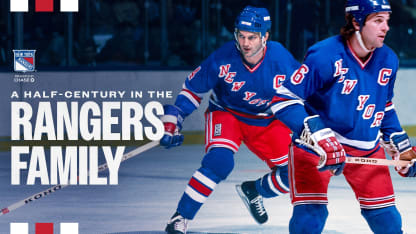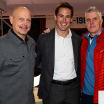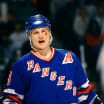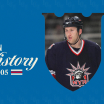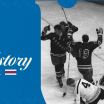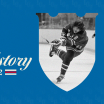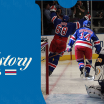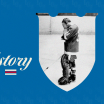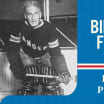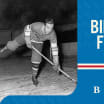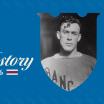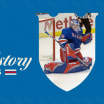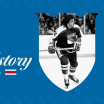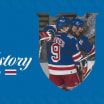“The rink is on the fifth floor?”
The date was September 30, 1974 and the Rangers’ two top selections in the 1974 NHL Amateur Draft, Dave Maloney (selected in the first round with the 14th overall pick) and Ron Greschner (selected in the second round with the 32nd overall pick), arrived at Madison Square Garden together for the team’s pre-season game against the Detroit Red Wings. It was the first time that either of them had been to their new professional home, and after they were dropped off outside of MSG, they asked a security guard where they should go.
“We had our bags and sticks with us and we were out front of The Garden,” Maloney recalled recently. “We got out of the cab with no idea where to go and we asked a security guard how we could get to the rink. The guard said to go to the employee entrance and take the elevator up to the fifth floor. We didn’t think there would be anything on the fifth floor.
“Sure enough, we got out of the elevator, and there it was.”
Half a century after their initial experience at The Garden, Greschner and Maloney continue to call MSG home.
"I go to The Garden for almost every game,” Greschner said recently. “Every time I go there, it still feels like the first time I went. I can't wait to get there, and I go with my kids there and they're all Rangers fans. It's hard to believe it was that long ago when I got here and that I'm still here.”
That Greschner and Maloney both became Rangers was the result of shrewd thinking by the Blueshirts’ General Manager in 1974, Emile Francis. The 1974 NHL Amateur Draft marked the first time since the universal Draft was adopted by the NHL in 1969 that teams had the ability to select players who were considered underage; prior to that, the qualifying age had been 20 years old.
If a team wanted to select a player who was younger than 20 years old, they had to do so in one of the first two rounds of the Draft. Another added wrinkle to the process was that the 1974 Draft was conducted over telephone; it was known as the “secret draft” and was done in an attempt to prevent teams in the rival World Hockey Association from knowing which junior players had already been selected by NHL teams.
Francis selected Maloney, who was 17 years old at the time, in the first round, making a calculated decision that it was unlikely he would be available when the Rangers picked again in the second round. The Rangers’ General Manager then hoped that Greschner, who was 19 years old at the time, would still be available as teams continued to select underage players who wouldn’t be available after the second round. Francis was elated when Greschner was still on the board when it was the Rangers’ turn to pick in the second round.
Greschner played seven games with Providence in the American Hockey League to begin the 1974-75 season before being called up by the Rangers, and he never looked back. Maloney spent the majority of his first season in professional hockey in Providence, but he played four games with the Blueshirts in December of 1974. At 18 years old, Maloney was one of a select few players at the time who had ever played for the Rangers at that age (the other occasions were all during the 1942-43, 1943-44, or 1944-45 seasons, when the Blueshirts needed reinforcements in the lineup while several regular players were serving in the military during World War II).
Significant changes were made to the Rangers’ roster during the mid-to-late 1970s, and Maloney and Greschner were two of several young players who would play a key role in the team’s success for years to come. Maloney’s aggressive style of play and ability to pass the puck and contribute offensively made him a reliable two-way defenseman. Greschner’s exceptional skating ability – combined with his size – made him a dangerous offensive threat.
Greschner, Maloney, and the Rangers of the late 1970s reached their apex during the 1978-79 season. At the start of the year, new General Manager/Head Coach Fred Shero named Maloney captain; at 22 years old, Maloney became the youngest captain in franchise history, which is a distinction he still holds today. In the Stanley Cup Playoffs, the Rangers defeated the Los Angeles Kings and Philadelphia Flyers before facing the rival New York Islanders in the Semifinals.
Despite being the underdogs against the Islanders, the Blueshirts held a three-games-to-two lead heading into Game 6 of the series at MSG. With the score tied, 1-1, in the second period and the Rangers on a power play, Greschner took a slap shot from just inside the blue line that beat Islanders goaltender Chico Resch. The goal gave the Rangers a lead they would not relinquish, as they defeated the Islanders, 2-1, to advance to the Stanley Cup Final and give The Garden Faithful one of its fondest memories.
“(Game 6 against the Islanders) was the loudest I have heard Madison Square Garden,” Greschner said. “The final five minutes, the whole building was shaking.”
Greschner and Maloney each scored a goal in Game 1 of the 1979 Stanley Cup Final, helping the Rangers defeat the Montreal Canadiens, 4-1, at the Montreal Forum. Although the Blueshirts did not win the series against the Canadiens, the 1978-79 Rangers remain one of the most memorable teams in franchise history.
Maloney ultimately played parts of 11 seasons with the Rangers, and his playing career ended following the 1984-85 season. Greschner played parts of 16 seasons in the NHL, all with the Rangers, and he retired following the 1989-90 season. Their playing careers, however, were just the beginning of their connection to the Rangers and New York.
In 1982, the Rangers organization created the Rangers Alumni Association to ensure that former Blueshirts would remain connected to the organization following their playing career. Maloney and Greschner played active roles with the Association upon the end of each of their respective playing careers. Through their connection with the Alumni Association and several community projects, Maloney and Greschner continued to represent the Rangers and helped strengthen the franchise’s brand.
In 2005, Maloney became the Rangers’ full-time radio analyst, a role which he still holds today; the 2024-25 season will be Maloney’s 20th season in the broadcast booth. Through his knowledge of the game and passion for the Rangers, Maloney’s analysis and excitement in calling games resonates with Blueshirts fans, and he is as popular of a figure now as he was when he was on the ice.
Five decades after they ventured up to the fifth floor of MSG for the first time, The Garden is still home for these two Blueshirts icons.
“It's very special,” Greschner said. “I know a lot of guys who have played on a lot of different teams, and everybody speaks highly of their alumni, but there aren't enough words to say how thankful all the Rangers alumni are to Mr. Dolan, Glen Sather, Chris Drury, and all the way down the line for how good the organization is to us.
"A lot of how I feel about the Rangers has to do with the Ranger fans. Every team has great fans, but it doesn't matter where you go, what arena you go to, there are Rangers fans. And it's not because of the guys who wore the uniform and played for the Rangers, it's because it's the New York Rangers and the logo. The front of the jersey is the most important thing.
“Madison Square Garden is my real home. I spend more time there than I do anywhere else. I've always been a Ranger and that will never change.”

